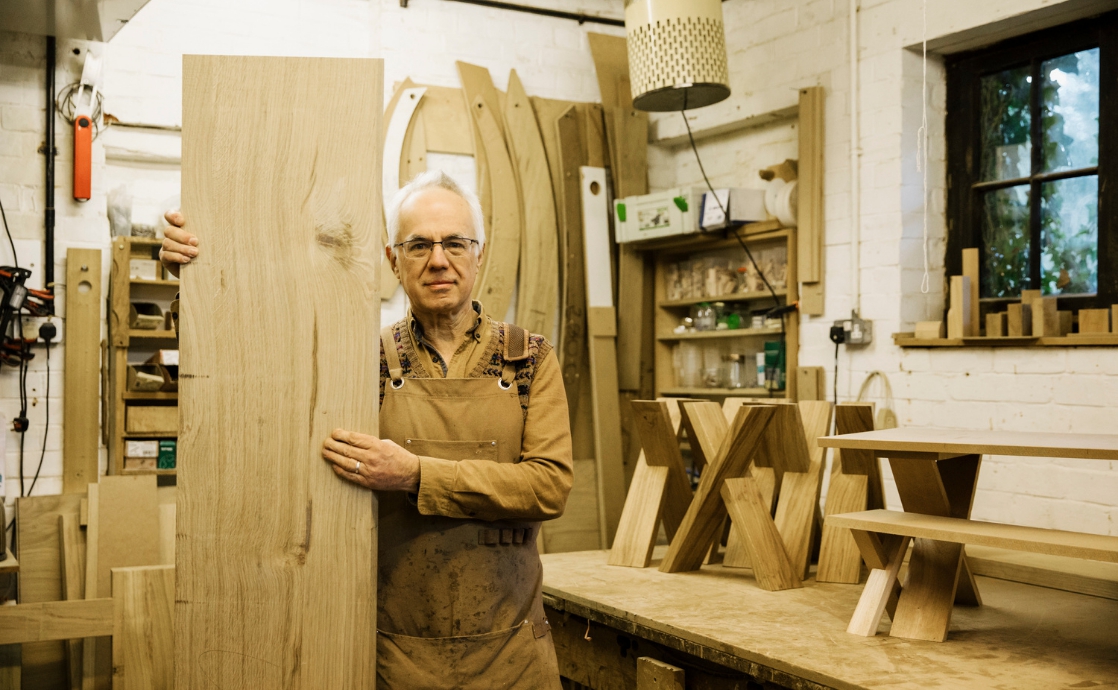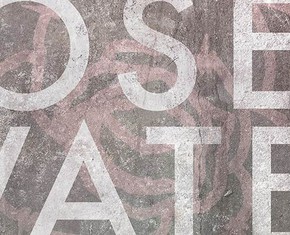The views expressed in our content reflect individual perspectives and do not represent the authoritative views of the Baha'i Faith.
Many considered craftspeople anachronisms in the 1970s, but over the last 40 years I’ve trained more than 20 people, who have now established their own workshops and are training others.
This shows that crafts offer a rewarding livelihood for those willing to commit to a lifetime of learning. Also, craftsmanship in its purest and noblest form can actually become a spiritual practice.
That spiritual practice, encouraged by the Baha’i principles, means that the Bab’s and Baha’u’llah’s teachings offer an unprecedented spiritual manifesto for artists and craftspeople, a guide that will undoubtedly inspire and direct artists and craftspeople for generations. To learn more, Baha’u’llah advised all people to: “Immerse yourselves in the ocean of My words, that ye may unravel its secrets, and discover all the pearls of wisdom that lie hid in its depths.”
RELATED: The Scholars and Craftsmen the Shrine of the Bab Honors
Craftsmanship in the 21st Century
The core ideal of craftsmanship – the pursuit of excellence for its own sake – exists in all professions and pursuits. According to the eminent sociologist Richard Sennett, craftsmanship is a universal work ethic. A doctor, a parent, a painter becomes a craftsperson when they dedicate their practice to doing something well for its own sake.
When I began working with wood at the age of 21, I had no particular skills or obvious talent for design – but the idea of how I could combine furniture design and creation with making a living fascinated me and became my goal. My confidence was sustained through the Baha’i vision of an unfolding civilization based on humanity’s oneness and inherent spirituality. Baha’u’llah wrote: “… the true worth of artists and craftsmen should be appreciated, for they advance the affairs of mankind.”
Despite the challenges, according to Baha’u’llah, making a living as a craftsperson is a form of spiritual detachment. For Baha’is, practicing detachment does not mean divorcing oneself from the world, but instead means practicing one’s chosen craft as a livelihood and for the greater good. In The Hidden Words, Baha’u’llah wrote: “The best of men are they that earn a livelihood by their calling and spend upon themselves and upon their kindred for the love of God, the Lord of all worlds.”
An independent craftsperson striving for excellence can therefore pursue a spiritual practice, as well.
The Myth of Talent
Many people initially feel unqualified for a creative life because they assume they lack the necessary talent – but Baha’u’llah’s writings empower all of us to see ourselves as spiritual beings with inherent talents and qualities, which explains why he described each human being as “… a mine rich in gems of inestimable value.”
Practice is the real secret to progress and discovering those gems. The psychologist Anders Ericsson, a pioneer in the science of expertise, shows that what we perceive as innate talent in others is actually the result of sustained practice over many years. In one of his earliest studies the difference between a competent violinist and a virtuoso one was twice the practice – a difference of 3500 hours amongst student musicians. In thirty years of research, Ericsson found the amount of practice represented the only measurable indicator of accomplishment. Just as the making of my furniture requires hours of sanding and polishing, these inner gems also require patient refining and polishing to reveal their potential and beauty. The creative act then becomes a twofold process: as we develop and refine our creative practice, we also develop and refine our character, becoming better versions of ourselves.
Conscientiousness
The one special quality needed to become a craftsperson, in my experience, is conscientiousness. That quality requires an internal compass that points toward the achievement of excellence, directing and sustaining both the aspiring and master craftsperson in their efforts. A conscientious apprentice craftsperson pursuing excellence as an end in itself, and guided by self-knowledge, will eventually become an accomplished craftsperson. In many ways, becoming a conscientious person, in any respect, simply means being true to yourself. Abdu’l- Baha pointed out that “Without truthfulness, progress and success, in all the worlds of God, are impossible for any soul.”
The Inner Life
One’s inner spiritual life requires the same commitment as one’s outer creative life. To sustain progress over a lifetime conscientiousness needs to be cultivated, just as a good gardener tends daily to his garden. In accordance with Baha’u’llah’s teachings I begin every day with a devotional and meditative practice. This act polishes the mirror of one’s heart. It helps remove the “dust” of worldly preoccupations, and protects one from disillusionment and cynicism. As an act of humility and spiritual re-focusing, it prepares me for the day’s work. In that sense, every day represents a new beginning – or, as Baha’u’llah wrote: “A pure heart is as a mirror; cleanse it with the burnish of love and severance from all save God, that the true sun may shine within it and the eternal morning dawn.”
The Workshop as a Sacred Space
Since 2018 I’ve worked on my own, having spent more than three previous decades managing a team of craftspeople. I now enjoy working in solitude with few distractions, and can experience the joy of making as a mindful endeavor. In that solitude, I have become increasingly conscious that my workshop is a sacred space. The work itself hasn’t changed, but I have a different approach – I am the maker now. In that way, every furniture commission becomes a sacred act, a reciprocated trust. I enter a relationship with a client in which we begin a co-creative process through a series of conversations that will guide me, eventually, to an idea, which I then translate into a piece of furniture I design and create. My workshop has produced over 1800 commissions from a special chopping board for a wedding present that took a few hours to make, to a commission for choir stalls that took 2000 hours. Each commission tells a unique story.
The Baha’i teachings have elevated art and craft done in the spirit of selfless service for the betterment of the world to the station of worship. Abdu’l-Baha said: “The more thou strivest to perfect it, the closer wilt thou come to God. What bestowal could be greater than this, that one’s art should be even as the act of worshipping the Lord?”
However, my workshop is not always an oasis of serenity – it can be a place of frenetic activity, of frustration, a disaster area, even a place of despair. A craftsperson’s relationship with his or her material is a conversation at best, but can also be a fight! Creating beautiful things can be fraught with challenges.
Beauty
While we can all appreciate the beauty inherent in nature, nature’s resources are extracted, commodified, and marketized with little reverence to their sacredness. By contrast, the Baha’i teachings offer a profound insight into the spiritual significance of materials. According to the Bab, Baha’u’llah’s herald and forerunner, every material thing in the world not only has an energy, a spirit, but also aspires to manifest its highest form of perfection. A stone, for example, aspires to be a ruby, a piece of paper aspires to have beautiful calligraphy written on it, and so it is with wood, metal, paint etc. It therefore becomes a spiritual act when the craftsperson creates objects that represent the highest level of refinement that they can achieve. The Bab wrote: “For each thing, within its own station, yearneth to attain unto the utmost height of excellence in its own level.”
RELATED: Bernard Leach: Uniting the East and West through Pottery
The Bab described this practice as a spiritual obligation, an act of conscientiousness, and true self-mastery: “For verily one who perfecteth his handiwork indeed attaineth certitude in the perfection of the handiwork of God within his own being.” This recently-translated teaching has awakened a new sensibility in me and has had a profound influence on my own practice; even after forty years of practice I find more to learn every day.
The Role of Craftsmanship in a World Civilization
As humanity searches for a direction, a purpose, a new form of craftsperson is already emerging, one who strives to live a holistic life through applying the intelligences of the body, mind, and spirit to create new forms that reflect their spiritual vision and attributes. In his writings Baha’u’llah made it clear that the deep well of those creative new forms comes from “the power of reflection:”
The source of crafts, sciences and arts is the power of reflection. Make ye every effort that out of this ideal mine there may gleam forth such pearls of wisdom and utterance as will promote the well-being and harmony of all the kindreds of the earth.
In this way, I’ve learned that craftsmanship can not only be a process of material transformation, but a process in which the craftsperson and ultimately society can be transformed.







Style: “Neutral”
Philip Koomen’s furniture is a creative response to the interconnectedness between craftsmanship, design and sculpture, inspired by the Baha’i teachings. He approaches the creative process as a form of applied spirituality: “The organic vitality of his designs reveals the oneness and humanity of his creative approach.” – Professor Simon Olding.
Philip’s practice began in 1975. He holds a PhD in Sustainable Furniture Design (Brunel University, UK); is Life Fellow of the Royal Society of Arts, and a Visiting Research Fellow at the Open University.
He lives near Oxford, UK, with his wife Esmyr. They have two children, Jonneke and Jody and two grandchildren, Maya and Layli.






















Comments
Sign in or create an account
Continue with Googleor